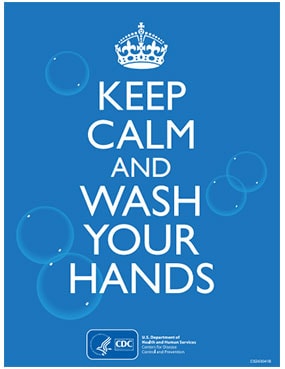
https://cdn.pixabay.com/photo/2020/03/15/04/27/vaccine-4932430__340.jpg
This guide provides information about the coronavirus and listings for free and interesting things you can do while you're stuck indoors. It will be updated regularly. Explore the tabs along the top of the page for curated links to a wide variety of resources.
What is the Coronavirus?
Coronaviruses (CoV) are a large family of viruses that cause illness ranging from the common cold to more severe diseases such as Middle East Respiratory Syndrome (MERS-CoV) and Severe Acute Respiratory Syndrome (SARS-CoV). The current strain of coronavirus (COVID-19) is a new strain that has not been previously identified in humans (World Health Organization).
As of mid-July 2020 the CDC has added to its list of symptoms, but cautions that not every patient experiences them all. This list does not include all possible symptoms:
These symptoms may appear 2-14 days after exposure to the virus.
When to Seek Emergency Medical Attention:
Look for emergency warning signs* for COVID-19. If someone is showing any of these signs, seek emergency medical care immediately:
*This list is not all possible symptoms. Please call your medical provider for any other symptoms that are severe or concerning to you.
Call 911 or call ahead to your local emergency facility: Notify the operator that you are seeking care for someone who has or may have COVID-19.
https://www.cdc.gov/coronavirus/2019-ncov/symptoms-testing/symptoms.html
The complete clinical picture with regard to the coronavirus is not fully known. Reported illnesses have ranged from very mild (including some with no reported symptoms) to severe, including illness resulting in death. Older people and people of all ages with severe underlying health conditions such as heart disease, lung disease and diabetes, seem to be at higher risk of developing serious illness (Center for Disease Control).
Health professionals across the country are urging the public to avoid crowded events, avoid traveling to areas with high confirmed cases of the virus, and to frequently wash your hands when encountering the public. This is an ongoing issue with new information being provided daily. Please look through the rest of this guide for more information and tips on prevention.
Adapted from Illinois Tech Library LibGuide and Washington Post article from 4/28/20
I'm fully vaccinated. What can I do now?
This article from the CDC explains.
The Center for Disease Control and Prevention has more information on hand washing.
How to Wash Your Hands from the NY Times
Disinfection
How to disinfect your home if someone gets sick.
Recommendations for U.S. Households with Suspected or Confirmed Coronavirus Disease 2019 (CDC)
What should I do if I feel sick? and other Questions.
Whenever there is a rapidly developing news story, especially one that might be causing some fear and panic, there is a big opportunity for misinformation to spread both intentionally and unintentionally. While it's always important to think about the quality of your sources, it becomes especially important in these situations. Here are a handful of recommended sources.
National Institues of Health (NIH)
News releases, blog posts and other resources from the nation's medical research agency.
ProQuest
Editors from ProQuest databases have selected relevant updated articles which are shared here. Includes the latest research and expert commentary.
Rapid Reviews: COVID-19
An open-access overlay journal that seeks to accelerate peer review of COVID-19-related research and prevent the dissemination of false or misleading scientific news
World Health Organization (WHO)
The WHO's information and guidance page on COVID-19. Includes news updates, questions and answers, introductory information, and "Myth-busters" about the virus.
With so much information on the Internet about the coronavirus, how can we determine what is fact and what is fiction? There are many websites that can help:
AFP Coronavirus Verification Hub
AFP's digital verification specialists work around the world to monitor online content in local languages. They take into account local contexts including culture and politics. Stories are edited by multilingual editors working in regional hubs and are updated daily.
Coronavirus Disease 2019 - Myth vs. Fact
From Johns Hopkins Medicine
FEMA Rumor Control
From the US Department of Homeland Security
The International Fact-Checking Network
A unit of the Poynter Institute dedicated to bringing together fact-checkers worldwide.
Mythbusters: Common misconceptions about the coronavirus
From WHO, the World Health Organization
Rumor FAQ - NJ Office of Homeland Security
Updated regularly. From the State of New Jersey Office of Homeland Security and Preparedness.
Six Questions That Will Tell You What Media to Trust
The American Press Institute guides you to reliable news sources with six questions: "It’s easier than you think. They will make you a more critical thinker and save you from being misled."
Snopes Coronavirus Collection: Fact-Checking COVID-19
Snopes is the oldest and largest fact checking site online.
The following resources discuss misinformation regarding the COVID-19 virus:
New York:
Daily Webcast (Office of Governor Cuomo)
NYC COVID-19 Citywide Information Portal
NYS on PAUSE Latest NY State Updates
NY STATE Coronavirus Hotline 24/7: 1-888-364-3065
New Jersey:
For those who are interested in statistics and graphs, there are many websites that are keeping track of worldwide data:
CDC US Cases, Data & Surveillance
Coronavirus Vaccine Tracker from the New York Times
COVID-19 Projections Charts showing projected hospital resource use by the U.S. and states from the Institute for Health Metrics and Evaluation
COVID-19 Situation in the European Region
COVID Act Now
Data science estimated projections for hospitals for U.S. states based on speed of response.
COVID Tracking Project
Institute for Health Metrics and Evaluation
Johns Hopkins University Map of Current Cases
Mapping of worldwide cases - frequently updated.
Nextstrain
Real time tracking of pathogen evolution

https://www.cdc.gov/coronavirus/2019-ncov/communication/factsheets.html